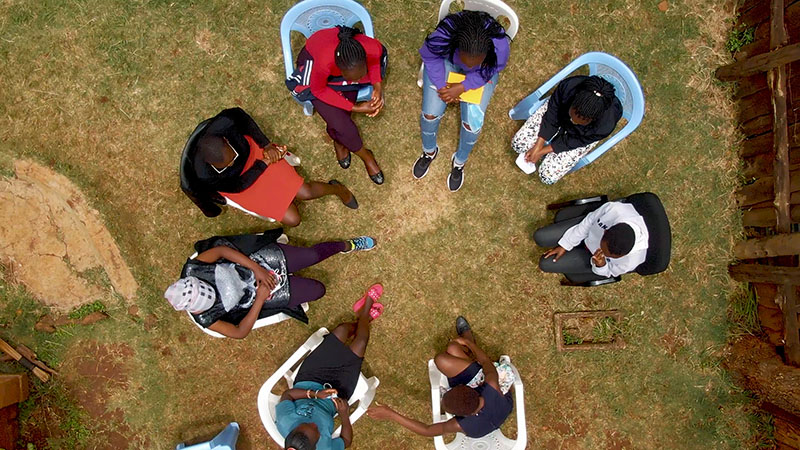
A better tomorrow is taking shape today: Kibera’s teenage warrior
Located just seven kilometers from Nairobi metropolis and Kenyas capital city, Kibera is Africas biggest informal settlement. Spread out over vast land, railroad tracks and water streams, it is quite a sight to behold.
This is home to Winnie Muyam Khaemba; 16 years old and a mother of one.
Walking down the narrow paths to her home, Winnie speaks a little about her family, “I live with my mum and two siblings, ‘sio mbali’(it’s not far) and my son, of course.” she immediately bursts out into an extended chuckle upon realizing that she had, for a moment, forgotten to add her son to the family portrait. She continues; “My mum works odd jobs to support our family.”
Winnie, 15 years old at the time, had just joined high school when she got pregnant. In our interview, she narrates how she found herself alone, constantly worrying that she would not be financially ready for the birth of her child and desperately dealing with the social stigma surrounding young mothers in her society. “In Kibera people discriminate because ‘umepata ball’ (you are pregnant) and believe that this is the end of you”, she continues; “..I couldn’t tell my mum ‘hatukua tunaongea vizuri’ (we weren’t in speaking terms)”. Her only option was to talk to the father of her child; a 19 year old student. He directed her to a clinic where she could access abortion. “He promised to send me the money to pay for the procedure; but never did”, she recounts.
She eventually built up the courage to break the news to her mother. Her mother was disappointed but not surprised. After all, this situation was commonplace in Kibera. Many health surveys in Kenya have reported that in low and middle class societies, 1 in every 5 girls falls pregnant by the age of 15 (Muturi, 2020). Teenage pregnancy is a major challenge facing girls, especially those residing in informal settlements and Winnie had just become part of the statistic. Her future seemed bleak, but this soon changed.
“Since I joined Polycom ‘imenisaidia’ (it has helped me) in raising my son. And it has come across as a silver lining…” she says.
Polycom is a community-based organization that seeks to empower young women in Kibera through various programs with a view of managing their lives positively. Polycom is also a member of FEMNET (The African Women’s Development and Communication Network) and a partner in advancing the rights of girls and young women at both national and regional levels. Winnie had heard about Polycom through a friend and found her way to their offices. It is here, under Polycom, that Winnie was introduced to mentors who helped strengthen her confidence and self-esteem reminding her that she was not alone and that becoming a teenage mother was not the end, but only marked the
beginning of another chapter in her life. “I wasn’t prepared when I got pregnant. Six months into the pregnancy I didn’t have anything! But ‘kuna zile vitu wamenipatia. Wamenisaidia sana!’(They really supported me). I can say that without Polycom I could not have had those things for maternity”, says a grateful Winnie. She adds; “what I tell people, usi think (don’t think) about killing yourself…there is something special about you”.
She now seeks to find a way back to school to finish what she started and enjoy her right to education. She confides, “Because I’m strong, I’m still telling my mum that I’ll go back to school”. Moving forward she seeks to work with Polycom and FEMNET to build upon her advocacy on Sexual Reproductive Health Rights (SRHR) to help stop teenage pregnancy in Kibera and beyond.
Studies have shown that limited access to sexual and reproductive health information and services is an obstacle to thousands of teenage girls and young women accessing contraceptives (Anumo, 2012).
Winnie shares that she did not know about family planning. “I think it was raised somewhere in school, form one perhaps. But nothing much really” she says. She continues, “I had heard about contraceptives but only of how they would cause health complications if someone as young as I am were to use them”.
Winnie’s story demonstrates the need to prioritize and accelerate SRHR information and services to teenage girls and young women in Kenya’s informal settlements.
There is also an urgent need to reignite dialogues on comprehensive sexual education to enable teenage girls make informed decisions.
References
Anumo, F. (2012, July 24). Universal Access to Reproductive Health Services. Https://Femnet.Org. https://femnet.org/2012/07/universal-access-to-reproductive-health-services/
Muturi, G. N. (2020, March 6). Teenage Pregnancy in Kenya. Https://Ncpd.Go.Ke/. https://ncpd.go.ke/teenage-pregnancy-in-kenya/
